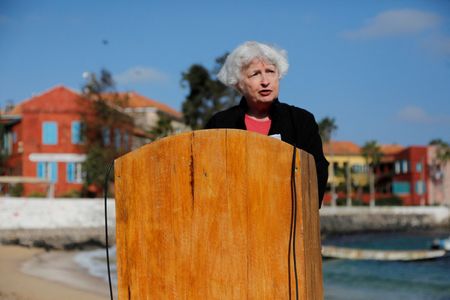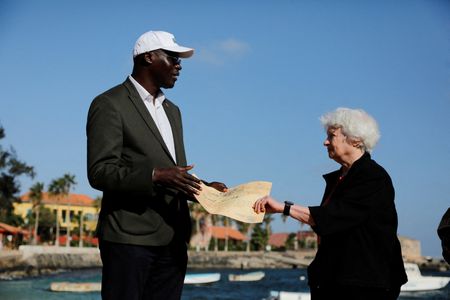By Andrea Shalal and Carien Du Plessis
LUSAKA (Reuters) – U.S. Treasury Secretary Janet Yellen’s three-country trip to Africa – the leading edge of a new diplomatic push by the Biden administration – aims to show the continent the United States is a true partner, one here for the long-haul.
But after decades of losing ground to China and the tumult of the Donald Trump years, when the former president threatened to slash aid and roll back military support, it is a tough sell.
As Africa struggles with economic headwinds caused by the COVID-19 pandemic, the war in Ukraine and, notably, Washington’s own monetary policy, Africans are asking for proof the United States will stay the course this time.
Yellen, so far, is at pains to make guarantees.
“I don’t know how I can give assurances, honestly,” she told Reuters in an interview en route from Senegal to Zambia. But Republicans and Democrats alike support long-standing initiatives, including in the areas of health and trade, she said.
Yellen’s trip kicks off a year of high-level U.S. visits that will include President Joe Biden, Vice President Kamala Harris, Trade Representative Katherine Tai, and Commerce Secretary Gina Raimondo.
Washington hosted African leaders from 49 countries and the African Union at a summit in December, where Biden said the United States was “all in” on Africa’s future and planned to commit $55 billion over the next three years.
African officials have broadly welcomed the United States’ renewed engagement. But the timing, two years into Biden’s four-year term, is viewed by many as “late and somewhat half-hearted”, said Chris Ogunmodede, a Nigerian researcher and associate editor of World Politics Review.
“The fears that Biden will not follow through, or that he could lose and be replaced by a hostile Republican administration, definitely exist,” he said.
CHINA, DEBT AND RATE HIKES
As the United States touts its long-standing ties to Africa and a renewed commitment to ramping up trade and investment, it’s playing catch-up with China and facing a growing challenge from Russia.
Chinese trade with Africa is about four times that of the United States, and Beijing has also become an important creditor by offering cheaper loans than Western lenders.
American officials – both Democrats and Republicans – have criticised China’s lending as lacking transparency and predatory.
In Senegal, Yellen warned Africa against “shiny deals that may be opaque and ultimately fail to actually benefit the people” and has accused China of dragging its feet on a critical debt restructuring in Zambia.
But U.S. fiscal policy is creating its own drag.
African countries have become collateral victims of this year’s rate hikes by the U.S. Federal Reserve, aimed at curbing inflation at home.
“Tightening financial conditions and the appreciating US dollar have had dire consequences for most African economies,” the African Development Bank (AfDB) wrote in a report last week.
The cost of debt service is expected to hit $25 billion next year according to the World Bank, up from $21.4 billion in 2022. In local currency term, it’s risen even faster, increasing the risk of debt distress, the AfDB stated.
African countries are also finding it harder to access capital markets to meet their fiscal needs and refinance maturing debt.
The United States, meanwhile, has largely failed to offer viable alternatives to cheap Chinese credit, officials said.
“China is an important partner,” Democratic Republic of Congo Finance Minister Nicolas Kazadi told Reuters. “It is clearly shown that it’s not easy to mobilise U.S. investors.”
One senior U.S. Treasury official said the United States had long been engaged in Africa, funding anti-HIV work and working on other health issues. “We don’t often talk about it. It’s not named bridges or highways … but if you think about just the sheer lives saved – estimates of 25 million lives saved with our engagement with (AIDS relief) – that is real.”
RUSSIAN CONFLICT
African countries have largely rejected U.S. pressure to take sides in the Russia-Ukraine conflict, some of them citing Moscow’s colonial-era support for their liberation movements.
Russia has blocked Ukrainian grain exports, driving up food inflation and aggravating one of the worst food crises in Africa’s history, U.S. officials note.
On Friday, Yellen said in Senegal that the war was hurting the continent’s economy, and that a Group of Seven-led price cap on Russian crude oil and refined products could save African countries $6 billion annually.
On Monday, though, South Africa hosted a visit by Russian Foreign Minister Sergei Lavrov and defended its decision to hold joint naval exercises with Russia and China off its east coast next month – a day before Yellen was scheduled to arrive.
“All countries conduct military exercises with friends worldwide,” South Africa’s Foreign Minister Naledi Pandor, standing alongside Lavrov, told reporters.
Washington, Beijing and Moscow are all courting African nations with their own interests in mind, say foreign policy experts including Ebrahim Rasool, a former South African ambassador to the United States. African leaders, hoping for greater representation in bodies like the G20 and UN Security Council, can play that game too.
“The U.S. sometimes has good intentions and meetings but not always the follow-through,” Rasool said, adding that sometimes Russia and China are needed to stir the U.S. into action.
(Additional reporting by Tim Cocks in Johannesburg, Ngouda Dione in Dakar, and Karin Strohecker, Jorgelina do Rosario and Marc Jones in London; Writing by Joe Bavier; Editing by Alistair Bell)


